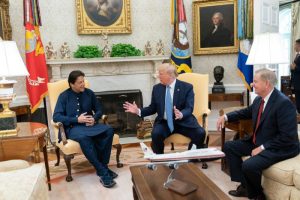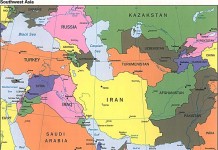 Pakistan has been in a political and economic downward spiral since Imran Khan’s government was removed in April 2022 through a no-confidence motion. The traditional civil-military tensions have also peaked – the nation faces grave human rights violations, and serious concerns regarding the rule of law are being raised. The future of nuclear-armed state with a population of nearly two hundred and fifty million stands in peril. The nation is also on the front-line of climate crisis – and floods in 2022 cost the country close to $30 billion in losses.
Pakistan has been in a political and economic downward spiral since Imran Khan’s government was removed in April 2022 through a no-confidence motion. The traditional civil-military tensions have also peaked – the nation faces grave human rights violations, and serious concerns regarding the rule of law are being raised. The future of nuclear-armed state with a population of nearly two hundred and fifty million stands in peril. The nation is also on the front-line of climate crisis – and floods in 2022 cost the country close to $30 billion in losses.

Since gaining independence in 1947, Pakistan has remained aligned with the West. It was a close U.S. ally during the Cold War and during the global war against terror and violent extremism – undertaken in the aftermath of 9/11. However, due to various geopolitical reasons, U.S.-Pakistan relations have stagnated. Some experts argue that the U.S. withdrawal from Afghanistan in 2021 created a misalignment of interests between the U.S. and Pakistan. Others state that the growing U.S.-India strategic ties and the economic and security initiatives by India with Gulf nations further altered the calculus for Pakistan.
There are two goals for the one-day seminar:
- To critically examine reasons for the decline of democratic rule, freedom of the press,
 human rights, and civil liberties in Pakistan, focusing on frayed military-civilian relations, national security and extremism, and internal political-economic factors.
human rights, and civil liberties in Pakistan, focusing on frayed military-civilian relations, national security and extremism, and internal political-economic factors. - To examine the current and future trajectory of U.S.-Pakistan relations with a focus on upcoming elections, the role of the Pakistani diaspora in democracy promotion, and areas of economic development.
 Please join us as our assembled scholars and speakers discuss and present their insights into Pakistan’s present political and economic turmoil and deliberate on how to navigate the way forward. Moreover, they will explore policy options for the U.S. to build a long-term strategic partnership with Pakistan by promoting and upholding shared values and mutual interests.
Please join us as our assembled scholars and speakers discuss and present their insights into Pakistan’s present political and economic turmoil and deliberate on how to navigate the way forward. Moreover, they will explore policy options for the U.S. to build a long-term strategic partnership with Pakistan by promoting and upholding shared values and mutual interests.

Speakers
Uzair Younus is a Director of Pakistan Initiative at the Atlantic Council and VP at The Asia Group. He was also a director at Albright Stonebridge Group’s South Asia practice. In this role, he helped clients develop strategies for long-term growth in the region and assess political and economic developments.
Dr. Hassan Abbas is a Distinguished Professor of International Security Studies, Chair of the Department of Regional and Analytical Studies (CISA) at US National Defense University. He was the Distinguished Quaid-i-Azam Chair Professor at Columbia University before joining CISA and has previously held fellowships at Harvard Law School and Asia Society in New York.
Dr. Qamar-ul Huda is a Michael E. Paul Distinguished Visiting Professor of International Affairs, United States Naval Academy (USNA). Formerly Dr. Huda was a Senior Policy Advisor for U.S. Department of State Secretary’s Office for Religion and Global Affairs (S/RGA) where he focused on civil society, religious communities, and diplomacy with non-government organizations. He was also selected as The World’s 500 Most Influential Muslims from 2016-2023, published by The Royal Islamic Strategic Centre, Amman, Jordan.
Arif Ansar is a CEO and Chief Analyst at PoliTact. Arif has over 20 years of consulting experience with various branches of the US government, including USAID, the Department of State, US Geological Survey, and the Department of Defense. His cross industry experience includes Defense-Security, International Development, and Information Technology sectors. From 1998-2000, he was also involved with the Water Rights sub-committee of the Middle East Peace Process (Israel, Jordan, Palestine).
The event is scheduled for August 19, 2023 from 12:00-2:30 pm – and will be held at the Oval Theater, Marshall Student Center, University of South Florida, 4202 E Fowler Ave, Tampa, Fl 33620.
The seminar is being co-organized by PoliTact and The Friends of Pakistan, Tampa, Florida. The is an in-person event, to receive a link for virtual attendance, please send an email to info@politact.com.
The Friends of Pakistan is a community organization made up of professionals which include medical doctors, influential businessmen, and entrepreneurs. The group members are involved in supporting several education and social welfare programs in Pakistan – and increasingly aspire to contribute towards climate resilience related initiatives.
For further information, email: info@politact.com.
Related Articles:
Great Power Rivalry And China’s Deepening involvement In South Asia, Gulf States
Pakistan’s Afghan Dilemma And TTP
Great Power Rivalry in South Asia and Ukraine
Emerging US Policy Towards Afghanistan After Withdrawal



